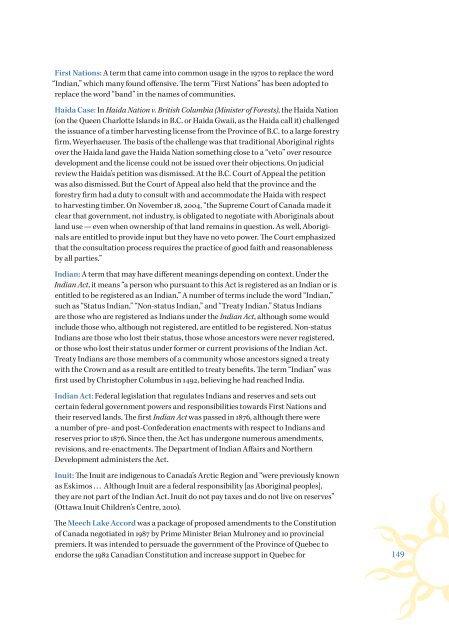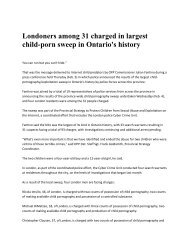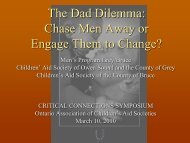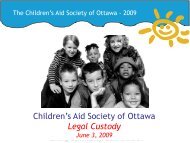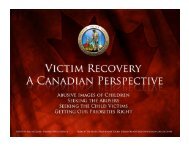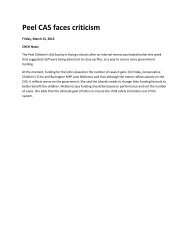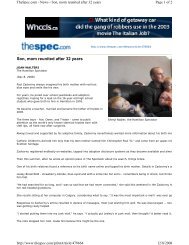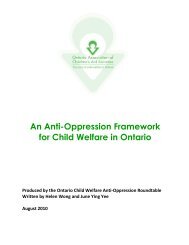English - Ontario Association of Children's Aid Societies
English - Ontario Association of Children's Aid Societies
English - Ontario Association of Children's Aid Societies
You also want an ePaper? Increase the reach of your titles
YUMPU automatically turns print PDFs into web optimized ePapers that Google loves.
First Nations: A term that came into common usage in the 1970s to replace the word<br />
“Indian,” which many found <strong>of</strong>fensive. The term “First Nations” has been adopted to<br />
replace the word “band” in the names <strong>of</strong> communities.<br />
Haida Case: In Haida Nation v. British Columbia (Minister <strong>of</strong> Forests), the Haida Nation<br />
(on the Queen Charlotte Islands in B.C. or Haida Gwaii, as the Haida call it) challenged<br />
the issuance <strong>of</strong> a timber harvesting license from the Province <strong>of</strong> B.C. to a large forestry<br />
firm, Weyerhaeuser. The basis <strong>of</strong> the challenge was that traditional Aboriginal rights<br />
over the Haida land gave the Haida Nation something close to a “veto” over resource<br />
development and the license could not be issued over their objections. On judicial<br />
review the Haida’s petition was dismissed. At the B.C. Court <strong>of</strong> Appeal the petition<br />
was also dismissed. But the Court <strong>of</strong> Appeal also held that the province and the<br />
forestry firm had a duty to consult with and accommodate the Haida with respect<br />
to harvesting timber. On November 18, 2004, “the Supreme Court <strong>of</strong> Canada made it<br />
clear that government, not industry, is obligated to negotiate with Aboriginals about<br />
land use — even when ownership <strong>of</strong> that land remains in question. As well, Aboriginals<br />
are entitled to provide input but they have no veto power. The Court emphasized<br />
that the consultation process requires the practice <strong>of</strong> good faith and reasonableness<br />
by all parties.”<br />
Indian: A term that may have different meanings depending on context. Under the<br />
Indian Act, it means “a person who pursuant to this Act is registered as an Indian or is<br />
entitled to be registered as an Indian.” A number <strong>of</strong> terms include the word “Indian,”<br />
such as “Status Indian,” “Non-status Indian,” and “Treaty Indian.” Status Indians<br />
are those who are registered as Indians under the Indian Act, although some would<br />
include those who, although not registered, are entitled to be registered. Non-status<br />
Indians are those who lost their status, those whose ancestors were never registered,<br />
or those who lost their status under former or current provisions <strong>of</strong> the Indian Act.<br />
Treaty Indians are those members <strong>of</strong> a community whose ancestors signed a treaty<br />
with the Crown and as a result are entitled to treaty benefits. The term “Indian” was<br />
first used by Christopher Columbus in 1492, believing he had reached India.<br />
Indian Act: Federal legislation that regulates Indians and reserves and sets out<br />
certain federal government powers and responsibilities towards First Nations and<br />
their reserved lands. The first Indian Act was passed in 1876, although there were<br />
a number <strong>of</strong> pre- and post-Confederation enactments with respect to Indians and<br />
reserves prior to 1876. Since then, the Act has undergone numerous amendments,<br />
revisions, and re-enactments. The Department <strong>of</strong> Indian Affairs and Northern<br />
Development administers the Act.<br />
Inuit: The Inuit are indigenous to Canada’s Arctic Region and “were previously known<br />
as Eskimos . . . Although Inuit are a federal responsibility [as Aboriginal peoples],<br />
they are not part <strong>of</strong> the Indian Act. Inuit do not pay taxes and do not live on reserves”<br />
(Ottawa Inuit Children’s Centre, 2010).<br />
The Meech Lake Accord was a package <strong>of</strong> proposed amendments to the Constitution<br />
<strong>of</strong> Canada negotiated in 1987 by Prime Minister Brian Mulroney and 10 provincial<br />
premiers. It was intended to persuade the government <strong>of</strong> the Province <strong>of</strong> Quebec to<br />
endorse the 1982 Canadian Constitution and increase support in Quebec for<br />
149


